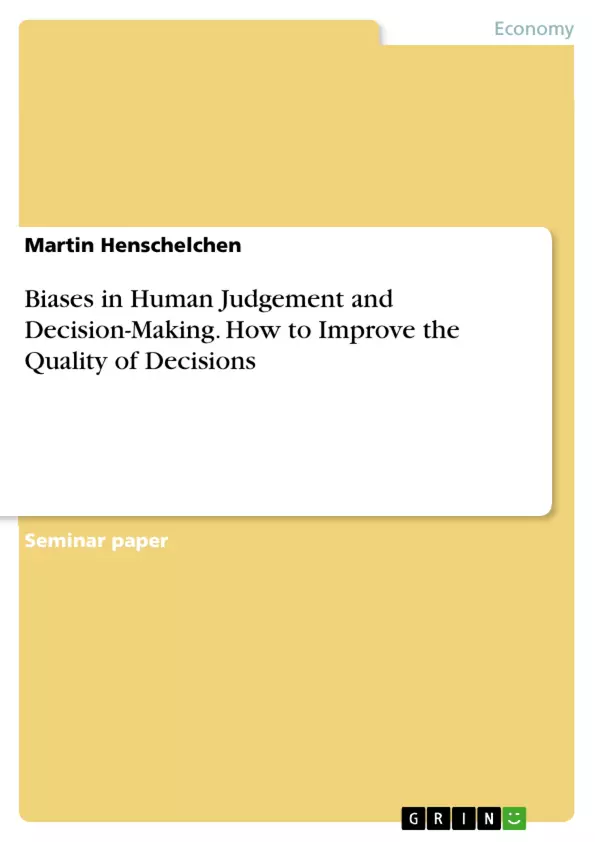A project's success depends mainly on the quality of the decisions. The influences on human judgments and decisions and how to reduce or avoid them are described in the following chapters. To successfully realise large-scale projects, the responsible decision-makers use project management instruments. The goal is to realise the project and its previously defined functionalities within a given time and budget. Although in project management, all the individual specifications of a project must be taken into account, generally applicable strategies have been established in recent years that can reduce the complexity, uncertainty and risks of a project. The process model, according to Hobel and Schütte, describes the project process in three phases: Project definition, project implementation, and project completion. The first phase is about project definition. Based on an analysis of the initial conditions, i.e. of the project object and environment, a clear, complete, measurable, realisable and scheduled project goal is defined. In a risk analysis, the likelyhood of occurrence and expected damage of certain risks are identified, and preventive and countermeasures for the event of occurrence are defined. In the second phase, individual contracts for the project realisation are awarded and carried out. The project’s progress is constantly monitored by project controlling and risk management using an internal control system. The project conclusion marks the last phase of a project. After completing all work, the project manager presents the work result to the client. The client reviews it with regard to the achievement of objectives and formally accepts it. The experience and knowledge gained are saved and flow back into new project processes in the form of suggestions for improvement and lessons learned. The project’s outcome depends on the management decisions of the project participants in the individual project phases. Decisionmaking in large-scale projects is shaped by the complexity of the project itself, dynamic relationships between the individual actors, the market, the environment and, above all, by the systematic nature of the decision-making processes in the face of limited rationality.
Inhaltsverzeichnis (Table of Contents)
- Introduction
- Decision-Making Processes
- Cognitive and Motivational Biases
- Debiasing Techniques
- Relevant Biases
- Less relevant Biases (easy to correct)
- More relevant Biases (Difficult to correct)
- Summary
- References
- Appendix
Zielsetzung und Themenschwerpunkte (Objectives and Key Themes)
This report aims to explore the impact of human judgment and decision-making biases on large-scale project management. The focus is on understanding how cognitive and motivational biases can lead to faulty decisions and suboptimal project outcomes.
- Decision-making processes and the role of limited rationality
- Identification and classification of cognitive and motivational biases
- Consequences of biases on project management effectiveness
- Strategies for mitigating the impact of biases
- Application of these concepts to real-world project scenarios
Zusammenfassung der Kapitel (Chapter Summaries)
The report commences by introducing the essential elements of project management and how decision-making processes influence project success. The second chapter delves into the concept of limited rationality and its implications for decision-making, contrasting rational decision-making with the role of heuristics and cognitive biases. The third chapter provides a comprehensive overview of cognitive and motivational biases, exploring their underlying causes and effects on project outcomes. This includes a detailed classification of biases and their respective impacts on decision-making.
Schlüsselwörter (Keywords)
This report focuses on the impact of human judgment and decision-making biases in project management, particularly addressing cognitive and motivational biases. Key topics include limited rationality, decision-making models, heuristics, bias classification, and strategies for debiaising.
Frequently Asked Questions
How do biases affect large-scale project management?
Biases can lead to faulty judgments regarding risks, budget, and timelines, often resulting in suboptimal outcomes despite the use of professional management instruments.
What is "limited rationality" in decision-making?
It is the idea that human decision-making is constrained by limited information, cognitive limitations, and time, leading people to use heuristics rather than purely rational models.
What are the three phases of a project process according to Hobel and Schütte?
The phases are Project Definition (goals and risk analysis), Project Implementation (execution and controlling), and Project Completion (review and lessons learned).
Can cognitive biases be easily corrected?
The report distinguishes between less relevant biases that are easy to correct and more relevant, deeply ingrained biases that are difficult to mitigate.
What are "debiasing techniques"?
These are strategies and methods used to reduce the influence of systematic errors in judgment, helping decision-makers reach more objective and accurate conclusions.
- Citar trabajo
- Martin Henschelchen (Autor), 2022, Biases in Human Judgement and Decision-Making. How to Improve the Quality of Decisions, Múnich, GRIN Verlag, https://www.grin.com/document/1284998



